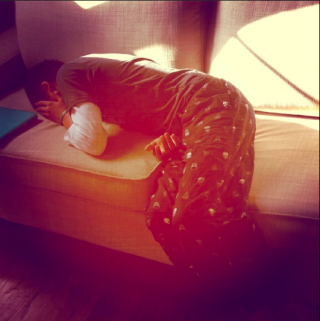Sleep
Helicopter Parenting Isn’t Killing Millennials, but This Is
Are you raising an exhausted superteen?
Posted August 3, 2015
Don’t you love histrionic headlines?
As a parent of a 13 year-old, I know I do.
Jokes aside, this topic is dead serious.
If I said it once, I’ve said it 1,000 times, if I had to choose just one area to focus on helping my therapy clients get better, it would be sleep. For myriad reasons, Americans don’t make sleep a priority.
Are you raising an exhausted superteen?
Life is lousy when you’re drowsy

The National Highway Traffic Safety Administration estimates that 100,000 police-reported crashes are the direct result of driver fatigue each year. This results in an estimated 1,550 deaths, and 71,000 injuries.
While your teen may not be driving yet, chances are her physical and mental health are suffering from inadequate rest.
Sleep deficiency, defined as not getting enough sleep or obtaining poor quality sleep, has been linked to health problems such as diabetes, obesity and cardiovascular disease. Chronic suppression of melatonin (a hormone which helps regulate sleep and wake cycles) has also been associated with increased risk of certain cancers.
Additional risks include lower levels of Human Growth Hormone (which is crucial to physical growth, brain development, and maturation of their immune system), as well as higher rates of anxiety disorders and depression.
According to a 2010 study in the journal Sleep, teenagers who go to bed after midnight are 24 percent more likely to suffer from depression and 20 percent more likely to consider harming themselves than those who go to bed before 10:00 p.m.
During a recent doctor visit, I learned that a local dermatologist opens at 7:00 a.m. so that high school students can get in early and avoid missing class.
Because that’s not contributing to their acne.
While preparing for a talk at the high school PTA last fall, I asked the principal about any recent trends she wanted me to address. Her answer: Sleepless competitions. Yes, you read that correctly — kids burning the midnight oil studying and boasting about who was the least bright-eyed and bushy-tailed the following day.
Enough is enough
I’m in no position to tell you how to run your life, and how to raise your teen. And I’m not denying the high cost of college tuition, or the number of university grads working at Starbucks, but if he’s stressed out, snappy and running on fumes, priorities may need to shift. Here are some suggestions:
- Reduce the extracurriculars
- Say goodbye to exorbitant tutors
- No additional advanced-placement classes
- Preach social/emotional IQ above common-core standards
The good news is you have more control over your teen’s behaviors than you may think. Most important is mindset. Everyone’s busy, so establish boundaries wherever possible, and remember we all have the same 24-hour timespan daily.
How to be a sleep ambassador
Check your work ethic. Is your desire for his success pushing him to his limits?
Ban caffeinated sodas and energy drinks from your home. Does this mean she won’t have access outside of the home? Of course not. But you can control the contents your fridge and pantry. While you’re at it, check the local grocers and gas stations for caffeine inhalants packaged in lipstick-sized canisters.
Check backpacks, purses and clothes for drugs. In an effort to stay on top of academics, some high school students share or sell ADD-meds like Adderall, and other amphetamines.
Set firm boundaries around your nighttime routine. Is recreational tech use during the week an option, or not? Is dinner clean-up mandatory, or not? Is homework review a priority, or not? Choose what works for your family’s needs.
Limit homework time. This one’s tough, but essential. Talk to his teacher or counselor if Advanced Chemistry homework keeps him up ’til 1:00 a.m. and he’s pulling a C-minus. Perhaps it’s time to drop down to Honors, or “regular” science class.
Be prepared. For the life of me, I don’t know why I don’t regularly enforce the backpack rule from my kid’s fourth grade teacher: “Make sure everything they need is ready to go and neatly placed in their backpack by them, before bedtime.” A no-brainer, really.
Remove tech devices before bedtime. The blue light from screen use in the evening alters sleepiness and alertness, and suppresses melatonin levels, which affects quality of sleep. Studies show it takes up to one hour for our brains to turn off after exposure to tech and certain television screens.
Role-model appropriate sleep by setting a bedtime for yourself. If she sees you preparing for an all-nighter, what is this communicating about a good night’s rest?
Wake up 15-minutes earlier than your teen. Taking a few minutes to set your intentions for the day (and drinking your coffee in peace and quiet), means you’re less likely to run around like a bat out of hell trying to get everyone out the door.
Success means something different depending on who you ask, but an alert, refreshed and emotionally stable kid is a great goal for any school year, and beyond.
Harvard and Yale may be accepting applications for walking zombies, but rest assured that less prestigious colleges are a stone's throw away.
Parents hold the key to healthy sleep habits. Sleep is the anchor for mental health, and mental health is more important than striving for elusive perfection.
*****
For the latest psychology + wellness resources subscribe to Wired for Happy.
Follow Linda Esposito on Facebook, Twitter, and Instagram.
Copyright 2015 Linda Esposito, LCSW




